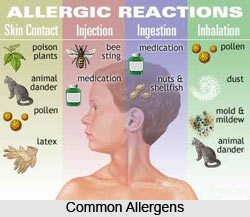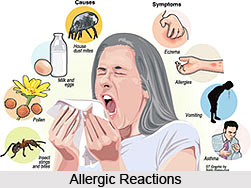 An allergen is a type of antigen that produces an abnormally vigorous immune response in which the immune system fights off a perceived threat that would otherwise be harmless to the body. Such reactions are called allergies. An allergen is a substance that can cause an allergic reaction. In some people, the immune system thinks allergens are foreign or dangerous. This is what leads to allergy symptoms.
An allergen is a type of antigen that produces an abnormally vigorous immune response in which the immune system fights off a perceived threat that would otherwise be harmless to the body. Such reactions are called allergies. An allergen is a substance that can cause an allergic reaction. In some people, the immune system thinks allergens are foreign or dangerous. This is what leads to allergy symptoms.
In technical terms, an allergen is a non-parasitic antigen that is capable of stimulating a type-I hypersensitivity reaction in atopic individuals and thus conflict them with allergy. Most humans mount significant Immunoglobulin E (IgE) responses only as a defence against parasitic infections. However, some individuals mount an IgE response against common environmental antigens. This hereditary predisposition in an individual is called atopy. In atopic individuals, non-parasitic antigens stimulate inappropriate IgE production, leading to type I hypersensitivity. Sensitivities of individuals vary from one person to another and it is possible to be allergic to an extraordinary range of substances.
Types of Allergens
Dust mite excretion, pollen and pet dander are all common allergens; however it is possible to be allergic to anything, even from chlorine or perfume. Food allergies are not as common as food sensitivity, but some foods such as peanuts, a legume, nuts, seafood and shellfish are the cause of serious allergies in many people. Officially, 8 kinds of foods as being common for allergic reactions in a large segment of the sensitive population, which includes, peanuts, tree nuts, eggs, milk, shellfish, fish, wheat and their derivatives, soy and their derivatives, and sulphites, which are chemical based, often found in flavours and colours in foods.
A few people have been recorded to be allergic to certain chemicals that are found in almost all water forms.
 Another type of allergen is urushiol, a resin produced by poison ivy and poison oak that causes the skin rash condition known as urushiol-induced contact dermatitis by changing a skin cell`s configuration so that it is no longer recognized by the immune system as part of the body. A little over half of North Americans are known to be allergic to urushiol and repeated exposure can increase one`s sensitivity to the allergen. Various trees and wood products such as paper, cardboard etc. can also cause mild to severe allergy symptoms through touch or inhalation of sawdust such as asthma and skin rash.
Another type of allergen is urushiol, a resin produced by poison ivy and poison oak that causes the skin rash condition known as urushiol-induced contact dermatitis by changing a skin cell`s configuration so that it is no longer recognized by the immune system as part of the body. A little over half of North Americans are known to be allergic to urushiol and repeated exposure can increase one`s sensitivity to the allergen. Various trees and wood products such as paper, cardboard etc. can also cause mild to severe allergy symptoms through touch or inhalation of sawdust such as asthma and skin rash.
Eating or drinking an item that the person is sensitive to (ingestion), breathing in pollen, perfume or pet dander (inhalation), or brushing body against an allergy-causing plant (direct contact, generally resulting in hives) can cause allergy. Other common causes of serious allergy are wasp, fire ant and bee stings, penicillin, and latex. An extremely serious form of an allergic reaction, which can kill anyone in few minutes, is called anaphylaxis. One form of treatment is the administration of sterile epinephrine (via "Epi-Pen") to the person experiencing anaphylaxis, which suppresses the body`s overreaction to the food ingested. After some time, the patient has to be transported to a medical facility.
Pollens are very common allergens. The house dust mite, its feces and chitin are also common allergens around the home. In addition to foreign proteins found in foreign serum (from blood transfusions) and vaccines.
Other Common Allergens
An allergen is an antigen which is most often eaten or inhaled, that is recognized by the immune system and causes an allergic reaction. Any form of direct contact with the allergen can cause an allergic reaction.
•Animal proteins and animal dander
•Bacteria and viruses
•Chemicals
•Dust
•Drugs (such as antibiotics or medications to put on the skin)
•Foods (such as milk, chocolate, strawberries, wheat)
•Perfumes
•Plants
•Pollen
•Smoke
•Insect stings
•Mold spores




